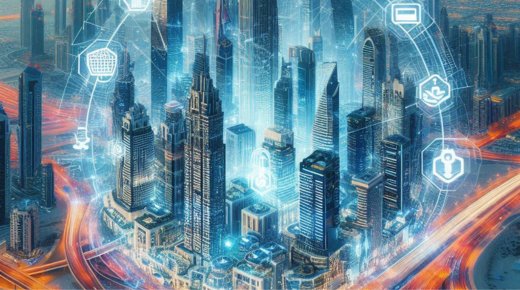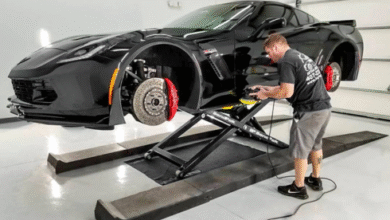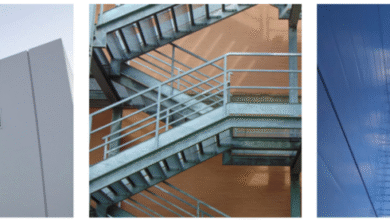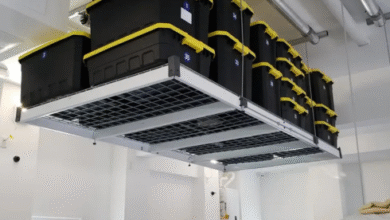“The Technological Renaissance of Dubai’s Real Estate Market – Embracing Innovation for a Smart Future”

By Dr. Pooyan Ghamari, Swiss Economist
Dubai has long been synonymous with rapid development, futuristic architecture, and an ever-evolving skyline. However, in recent years, it’s not just the physical infrastructure of Dubai’s real estate market that has been undergoing a transformation; the digital landscape has also been dramatically reshaped by technological advancements. The marriage of technology and real estate is creating unprecedented opportunities, efficiencies, and innovations, putting Dubai at the forefront of the global property market.
As technology continues to revolutionize industries across the world, the real estate sector in Dubai is no exception. From blockchain technology to artificial intelligence, big data, and virtual reality, technology is becoming the backbone of how property transactions are carried out, how developments are planned, and how residents experience their living spaces. This evolution isn’t just about adopting new tools but about reshaping the entire market to meet the needs of a fast-changing digital era.
Artificial Intelligence (AI): Powering Smart Decisions
Artificial intelligence has rapidly emerged as one of the most transformative forces in Dubai’s real estate market. From predictive analytics to automated customer service, AI is playing a pivotal role in improving efficiency, reducing costs, and enhancing the customer experience.
For property buyers and investors, AI-powered platforms provide personalized recommendations based on market trends, individual preferences, and financial capabilities. This data-driven approach allows for more informed decision-making, ensuring that buyers are matched with properties that align with their unique needs. Additionally, AI-driven chatbots are becoming a common feature on property websites, offering instant responses to customer inquiries and guiding potential buyers through the initial stages of property selection.
For developers and real estate firms, AI’s ability to analyze vast datasets offers valuable insights into market demand, pricing strategies, and construction timelines. Developers can use AI to optimize building designs and construction processes, ultimately reducing costs and ensuring projects are completed on time.
Blockchain: Revolutionizing Property Transactions
Blockchain technology is set to revolutionize property transactions in Dubai, offering a level of transparency, security, and efficiency that was previously unattainable. Traditional real estate transactions are often time-consuming and involve numerous intermediaries, including brokers, banks, and legal professionals. Blockchain eliminates many of these hurdles by enabling peer-to-peer transactions through decentralized digital ledgers.
The introduction of smart contracts is one of the most significant innovations in this space. These contracts are self-executing and automatically enforce the terms of an agreement once pre-set conditions are met, reducing the need for intermediaries. Blockchain’s transparency ensures that all parties involved in a transaction can trace the process in real-time, significantly reducing the risks of fraud and disputes.
Dubai’s government has already taken bold steps to integrate blockchain into its real estate sector, with the Dubai Land Department leading the charge to create a fully digitized property transaction ecosystem. This move aligns with Dubai’s ambition to become the world’s first blockchain-powered city, further solidifying its position as a global leader in real estate innovation.
Virtual Reality (VR) and Augmented Reality (AR): Redefining Property Viewing
The integration of virtual reality (VR) and augmented reality (AR) into Dubai’s real estate sector has dramatically changed how properties are marketed and viewed. In a city that attracts a significant portion of its investment from international buyers, these technologies provide a solution for potential investors who may not be able to physically visit properties.
With VR, buyers can take immersive virtual tours of properties from anywhere in the world, allowing them to explore every detail of the space before making a purchasing decision. This technology is particularly useful for off-plan developments, giving potential buyers the opportunity to visualize properties that have yet to be built.
AR, on the other hand, enhances the viewing experience by overlaying digital information onto the real world. Buyers can use AR apps to see how a property might look with different furniture layouts or design modifications, enabling them to make more informed choices.
For developers, VR and AR offer a competitive edge by allowing them to showcase properties in innovative ways, reaching a global audience and enhancing the buying experience. These technologies are also becoming essential tools during the design phase, helping architects and planners visualize projects before construction begins.
Big Data: Driving Informed Investments
Big data is quickly becoming a cornerstone of the real estate industry, and in Dubai, it’s being harnessed to make smarter investment decisions. With vast amounts of data generated from property transactions, customer behavior, and market trends, big data analytics can provide insights that help developers, investors, and buyers navigate the complexities of the real estate market.
For example, big data allows developers to track emerging trends in consumer preferences, helping them tailor projects to meet the demands of specific demographics. Investors can use predictive analytics to forecast which areas of Dubai are likely to experience growth in property values, ensuring that they make strategic investments in high-potential neighborhoods.
Moreover, big data is instrumental in helping real estate firms optimize pricing strategies, assess risk, and develop marketing campaigns that are targeted and effective. By understanding buyer preferences and behaviors, real estate professionals can offer more personalized experiences, increasing the likelihood of successful transactions.
Sustainability and Smart City Integration
Dubai is not only focused on technological advancements for operational efficiency but also on the creation of sustainable urban spaces. With the global push toward environmental sustainability, Dubai’s real estate sector is incorporating smart city technologies and eco-friendly initiatives to create greener, more sustainable developments.
One of the prime examples of this shift is The Sustainable City, an award-winning development that incorporates solar power, water recycling, and green building materials to minimize environmental impact. The development serves as a model for future real estate projects, reflecting Dubai’s commitment to reducing carbon emissions and fostering sustainable urban growth.
Smart city technologies, such as intelligent energy management systems, water conservation solutions, and sustainable transportation options, are being integrated into new developments across the city. These innovations not only align with Dubai’s sustainability goals but also offer long-term financial benefits for property owners by reducing utility costs and enhancing property value.
Government Initiatives and Policy Support
Dubai’s government has played a pivotal role in facilitating the adoption of technology in the real estate sector. Through initiatives such as the Dubai 10X program, which aims to position Dubai ten years ahead of other cities in terms of innovation, and the Dubai Blockchain Strategy, the government is creating an environment that encourages technological integration.
The Dubai Land Department’s move towards blockchain-powered transactions, for example, is part of the broader Dubai Paperless Strategy, which aims to eliminate paper-based transactions across government services by 2025. This regulatory support is helping create a more transparent, efficient, and investor-friendly market.
The Future of Real Estate in Dubai: A Technological Revolution
Dubai’s real estate market is poised for continued growth and transformation as technology continues to reshape the industry. With advancements in AI, blockchain, VR, big data, and sustainable technologies, the market is becoming more efficient, transparent, and accessible to a global audience.
For investors and buyers, this technological evolution presents unprecedented opportunities. Properties can now be purchased with greater confidence, transactions are more secure and transparent, and the overall experience of buying and managing property is becoming increasingly seamless.
Dubai’s bold embrace of technology is not only transforming its real estate market but also setting a global standard for how cities can harness innovation to create more efficient, sustainable, and investor-friendly environments.
This article was originally published on a.land. For more information and opportunities, visit shop.a.land.




